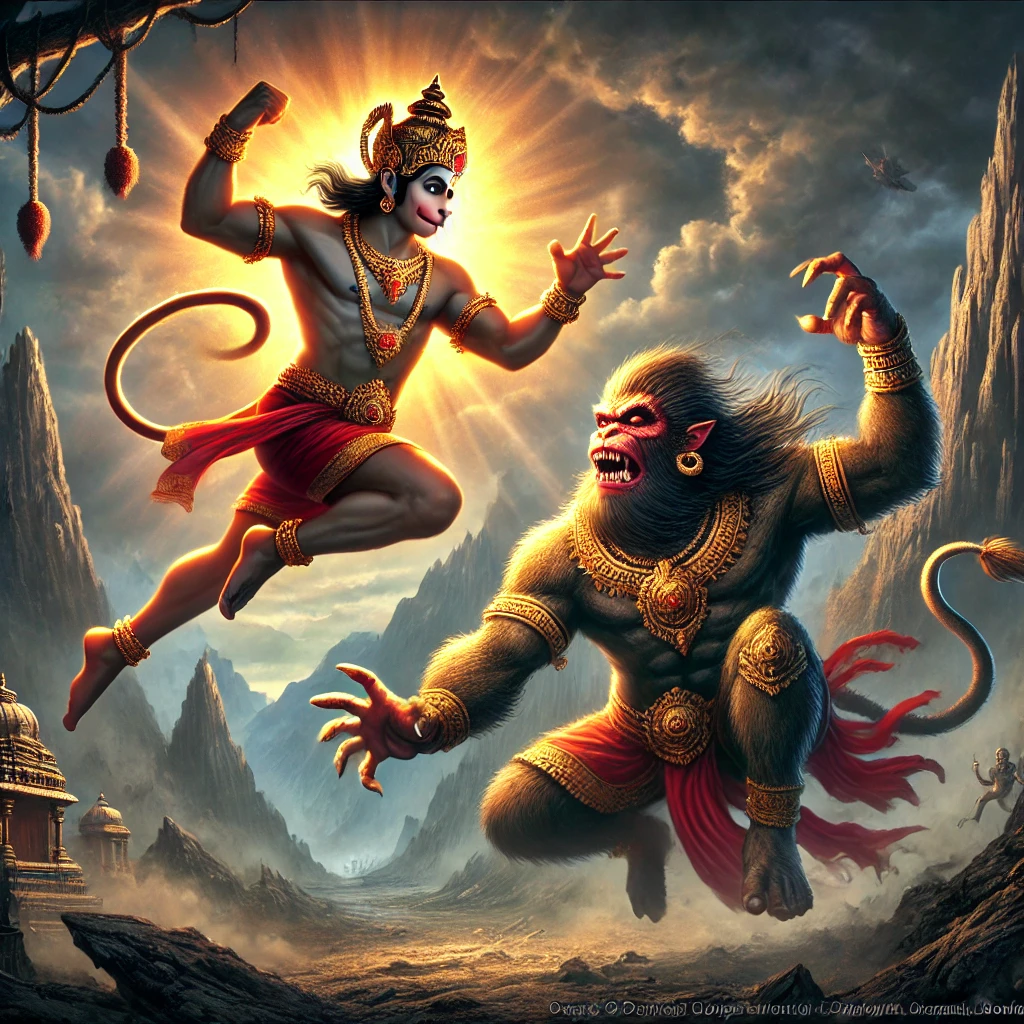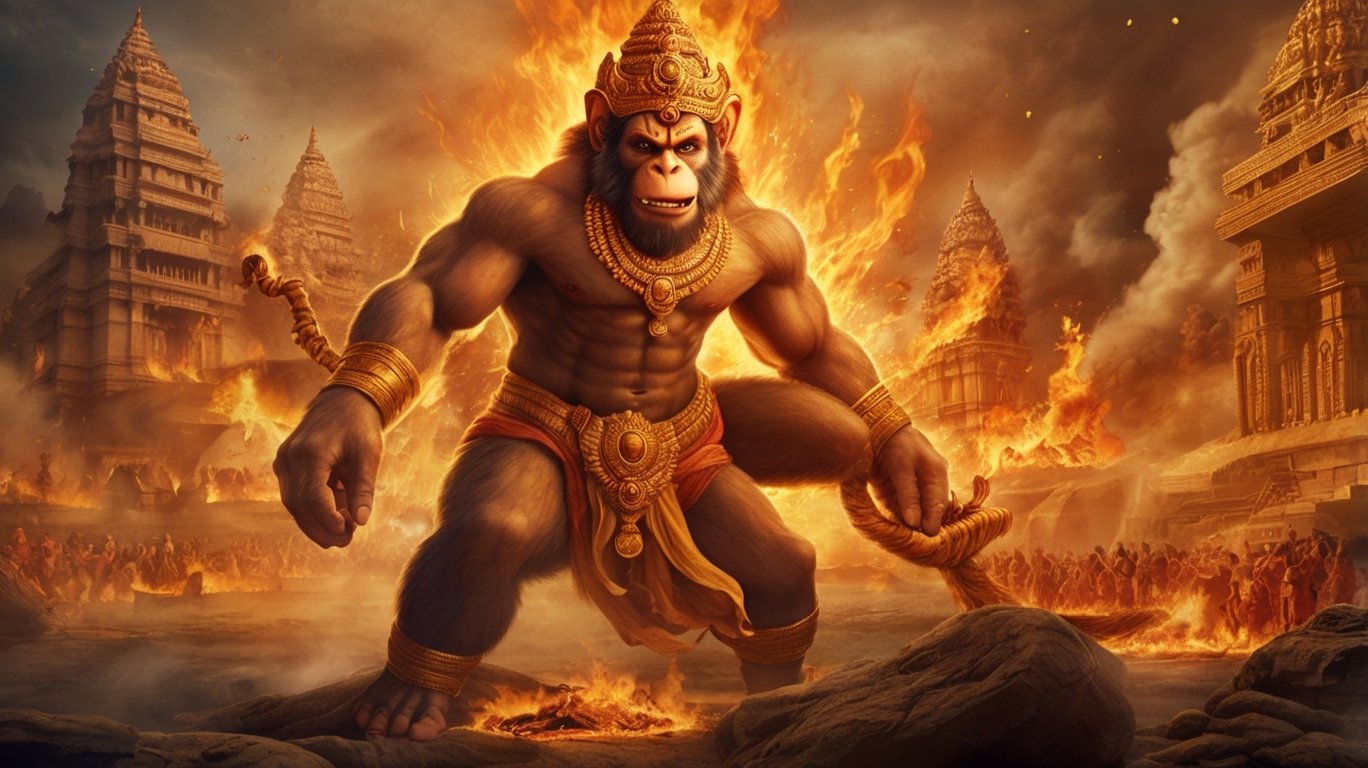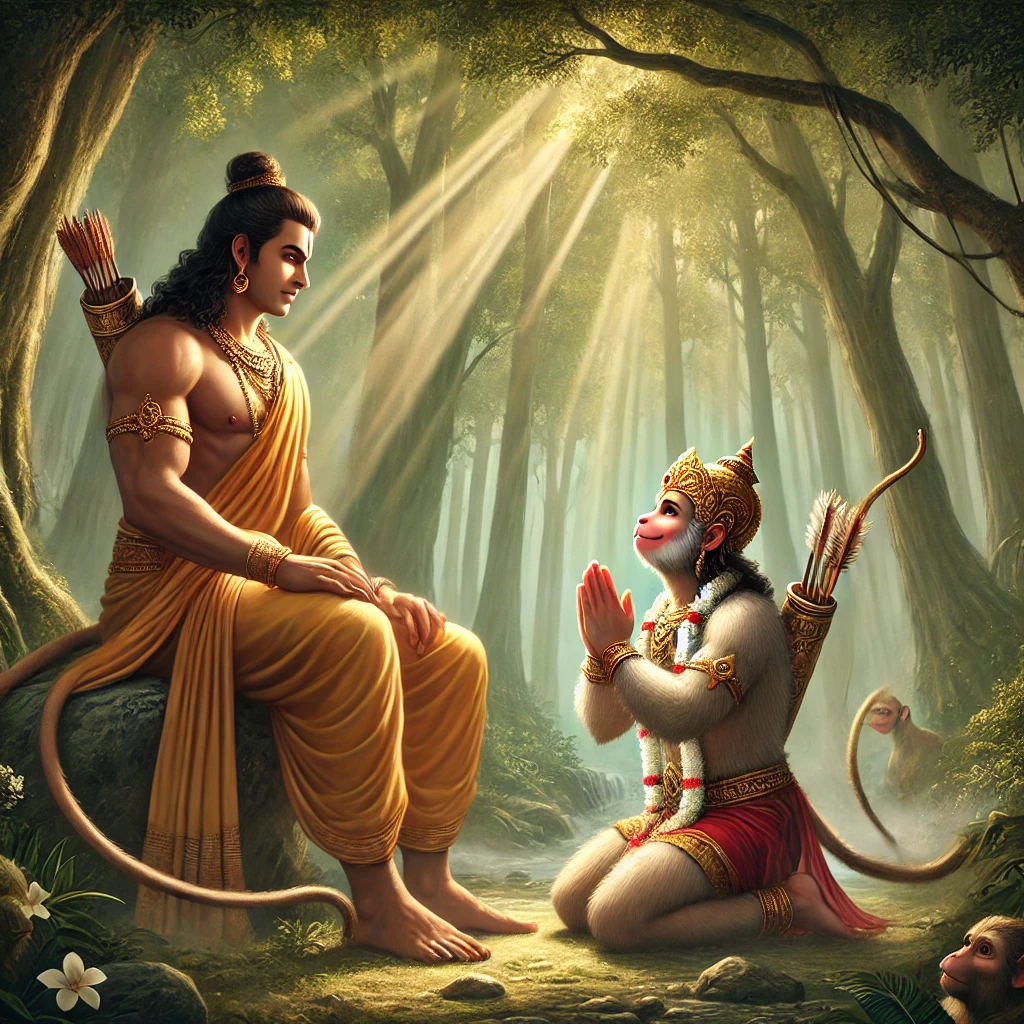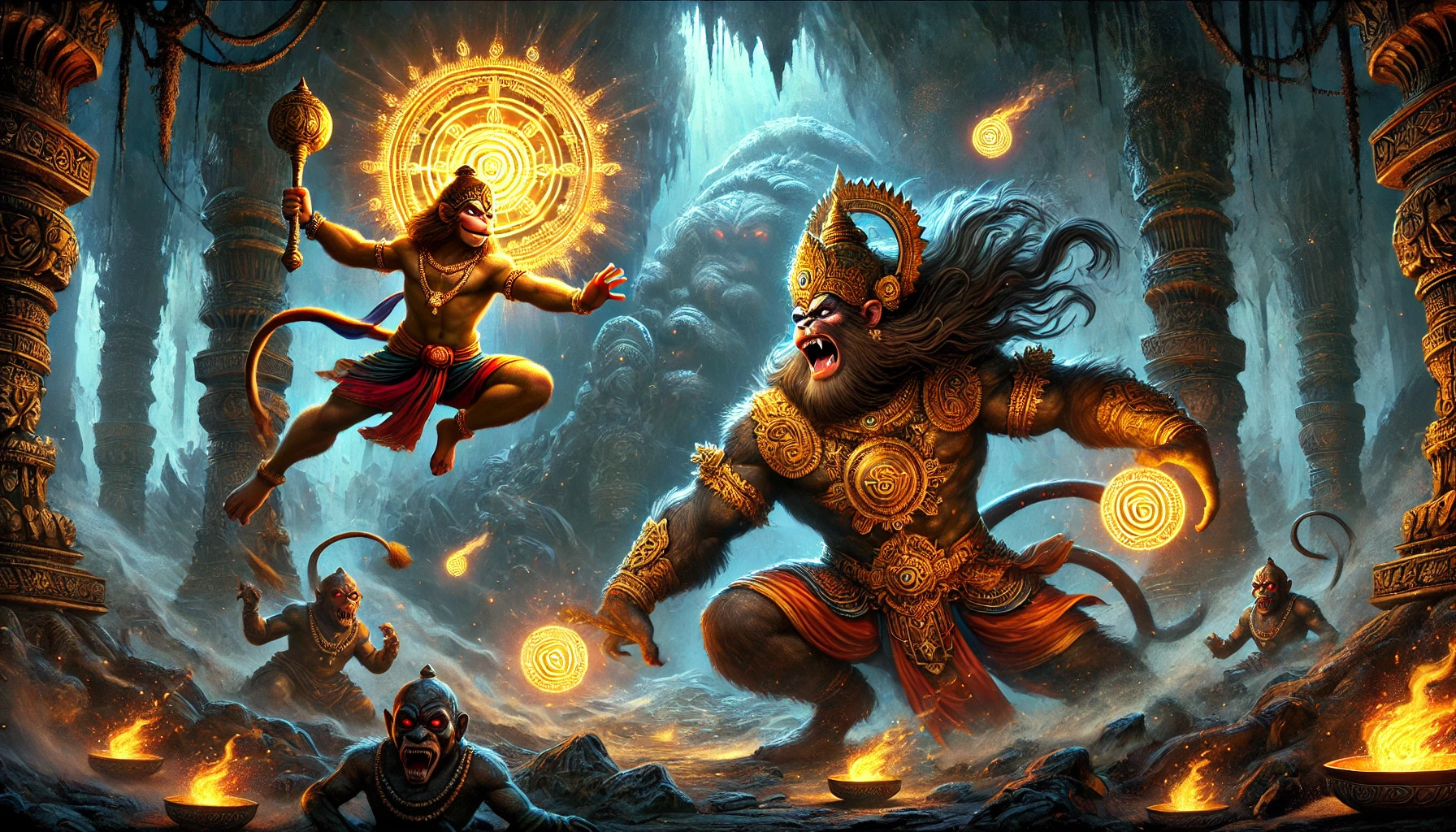Table of Contents
Introduction
Dear readers,
Namaste and welcome back to Bedesii.com, your sanctuary for exploring the profound depths of Hindu mythology and spirituality. Today, we embark on yet another fascinating journey, diving into the lesser-known yet deeply inspiring tale of Makardhwaj, the miraculous son of Lord Hanuman.
The name Hanuman instantly evokes images of unparalleled devotion, boundless strength, and unwavering faith. But did you know that the legacy of this divine hero extends beyond his own vows of celibacy? The tale of Makardhwaj, born through divine intervention, is a testament to the mysteries and miracles that abound in Hindu lore.
In this post, we’ll unravel the extraordinary story of Makardhwaj—his miraculous birth, his fateful meeting with his father, and his pivotal role in the Ramayana. This narrative intertwines themes of destiny, transformation, and the eternal struggle between dharma (righteousness) and adharma (unrighteousness), offering timeless lessons for our spiritual journey.
So, settle in as we weave this captivating tale. By the end of this exploration, you’ll not only gain insight into the life of Makardhwaj but also discover profound reflections on duty, devotion, and divine purpose that continue to resonate across generations.
Let us delve into the magical world of Makardhwaj and uncover the legacy of the son of Hanuman. The story awaits!
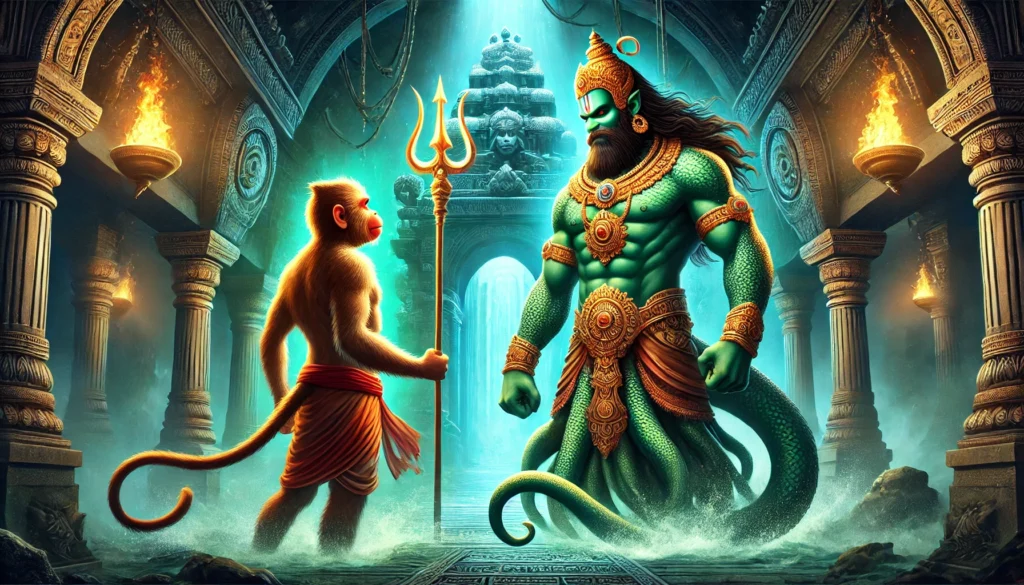
The Story of Makardhwaj: A Tale of Divine Destiny and Redemption
Hindu mythology is a treasure trove of miraculous births and divine interventions, and the story of Makardhwaj is a shining example. Known as the son of Lord Hanuman, Makardhwaj’s origin is steeped in mysticism, transformation, and destiny. This tale adds a fascinating chapter to the epic Ramayana, blending themes of duty, divine lineage, and redemption.
The Birth of Makardhwaj
Lord Hanuman, revered for his unwavering devotion to Lord Rama and his unparalleled strength, is also known for his strict vow of celibacy (brahmacharya). Yet, through a twist of divine intervention, he fathered a son, Makardhwaj, who played a pivotal role in the Ramayana.
The Incident at Sea
During the climactic battles of the Ramayana, Hanuman performed the extraordinary feat of setting Lanka ablaze with his fiery tail, a demonstration of his might and his fury against injustice. The intense flames engulfed the city, leaving a trail of destruction. To cool himself after this act, Hanuman plunged into the ocean.
As his body touched the water, a drop of his sweat, imbued with divine power, fell into the sea. This single drop was consumed by a giant fish, initiating an extraordinary transformation within the creature. Unknown to Hanuman, this moment marked the beginning of a new chapter in his divine legacy.
Transformation and Birth
The fish that consumed Hanuman’s divine essence was no ordinary creature. It became pregnant, its body nurturing the divine energy. When this fish was later caught by fishermen loyal to the demon king Ahiravana, it was brought to the underworld (Paatal Lok). Upon being cut open, the fishermen were astonished to find a child emerging from its belly.
This child was unique: his upper body resembled that of a monkey, while his lower body bore traits of a fish. Recognizing his divine aura, Ahiravana named the child Makardhwaj, a nod to his aquatic origins (Makara meaning crocodile or sea creature). Impressed by Makardhwaj’s potential, Ahiravana appointed him as the guardian of Paatal Lok.
Makardhwaj’s Role in Paatal Lok
Makardhwaj grew up in Paatal Lok, loyal to Ahiravana, his benefactor. Trained as a warrior, he served as the gatekeeper of the netherworld, ensuring its security against all intruders. His sense of duty and commitment made him a formidable guardian, respected and feared by those who encountered him.
The Reunion of Hanuman and Makardhwaj
Fate orchestrated a reunion between father and son during a critical moment in the Ramayana. Ahiravana, a devotee of Goddess Mahamaya and an ally of Ravana, abducted Lord Rama and Lakshmana during the war in Lanka. He planned to sacrifice them to his goddess to ensure his victory over the forces of dharma. Hanuman, determined to rescue them, ventured into Paatal Lok.
At the gates, he encountered Makardhwaj, who challenged him. Struck by the resemblance between them, Hanuman inquired about Makardhwaj’s identity. Proudly, Makardhwaj declared himself as the son of Hanuman, recounting the tale of his miraculous birth through the fish.
The Father-Son Duel
Hanuman, bound by his celibacy vow, initially refused to believe Makardhwaj’s claims. Convinced that this was a trick to delay his mission, he demanded passage into Paatal Lok. However, Makardhwaj, loyal to his duty as the guardian, refused to let Hanuman pass without a fight. This led to an epic duel between father and son.
The battle was fierce, with both warriors displaying extraordinary strength and skills. Ultimately, Hanuman emerged victorious, subduing Makardhwaj by binding him with his mighty tail. Despite the defeat, Hanuman was deeply impressed by Makardhwaj’s valor and sense of duty.
Revelation and Redemption
Following the battle, Hanuman learned the full truth of Makardhwaj’s birth and lineage. Overwhelmed with a mix of emotions, he accepted Makardhwaj as his son, acknowledging the divine will that had brought them together. This reunion was not just a familial bond but a merging of their destinies.
Makardhwaj, in turn, pledged his allegiance to Hanuman and offered to assist in the rescue mission. With his guidance, Hanuman infiltrated Ahiravana’s palace, defeated the demon king, and rescued Lord Rama and Lakshmana.
Makardhwaj’s Elevation
Impressed by Makardhwaj’s bravery and loyalty, Lord Rama bestowed upon him a great honor. He appointed Makardhwaj as the ruler of Paatal Lok, entrusting him with the responsibility of upholding dharma in the underworld. This act elevated Makardhwaj’s status, linking him eternally to the divine saga of the Ramayana.
Symbolism in the Story of Makardhwaj
The tale of Makardhwaj offers profound insights into Hindu philosophy and spirituality:
1. Divine Will: The miraculous birth of Makardhwaj illustrates the boundless nature of divine intervention, transcending human limitations.
2. Duty Above All: Makardhwaj’s unwavering commitment to his role as a guardian underscores the importance of dharma (duty) in Hindu tradition.
3. Redemption and Transformation: The transformation of a fish into the mother of a divine being symbolizes the potential for redemption and change in every being.
4. Legacy Beyond Vows: Hanuman’s celibacy did not hinder the continuation of his divine qualities, showcasing that lineage can manifest in unexpected ways.
Cultural and Devotional Significance
Makardhwaj’s story, though lesser-known, holds a special place in the hearts of devotees. Temples dedicated to him, such as the Hanuman-Makardhwaj Temple in Gujarat, celebrate his valor and divine connection. Devotees often seek his blessings for courage and protection, invoking the bond between father and son.
Conclusion
The story of Makardhwaj is more than a tale of miraculous birth and reunion; it is a narrative of duty, transformation, and divine legacy. It enriches the Ramayana’s lore by highlighting the interplay of destiny and devotion, offering timeless lessons for spiritual seekers. Through his extraordinary life, Makardhwaj reminds us that even the most unexpected origins can lead to profound connections and roles in the cosmic order.
FAQ
How powerful was Makardhwaj?
Makardhwaj, son of Hanuman, was a formidable warrior with immense strength, agility, and resilience. He wielded powerful weapons and inherited divine abilities, potentially including aquatic traits due to his connection with the Makara creature.
Did Hanuman Ji have a son?
Yes, Hanuman had a son named Makardhwaj. According to mythology, Makardhwaj was born when a drop of Hanuman’s sweat fell into the sea and was consumed by a fish, showcasing an unconventional divine parenthood.
What role does Makardhwaj play in the Ramayana?
Makardhwaj serves as the guardian of Paatal Lok and initially opposes Hanuman. After their bond is revealed, he assists in defeating Ahiravana and is later appointed as the ruler of Paatal Lok by Lord Rama.
What happened to Makardhwaj after the Ramayana?
After the Ramayana, Lord Rama appointed Makardhwaj as the king of Paatal Lok. His legacy endures through temples and cultural narratives in Indian mythology.



